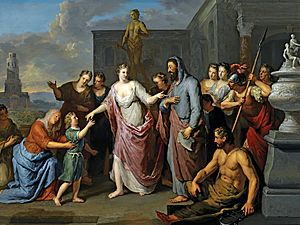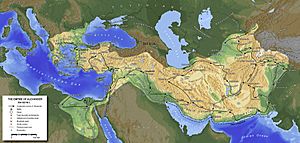Callisthenes facts for kids
Callisthenes of Olynthus (pronounced: /kəˈlɪsθəˌniːz/; Greek: Καλλισθένης; around 360 – 327 BCE) was an important Greek historian. He lived in Macedon and was connected to both the famous philosopher Aristotle and the great leader Alexander the Great.
Callisthenes joined Alexander the Great on his journey through Asia. He worked as Alexander's official historian and helped share news about his achievements. Later, Callisthenes disagreed with Alexander's decision to adopt Persian culture. This disagreement led to his death. During his life, Callisthenes wrote several books about Greek history and a biography of Alexander the Great.
Contents
Early Life and Learning
Callisthenes was born in a city called Olynthus around 360 BCE. We don't know much about his early childhood. However, we do know that his mother, Hero, was the niece of Aristotle. This made Callisthenes Aristotle's great-nephew.
By 347 BCE, Callisthenes was studying under Aristotle. He spent a lot of his early life writing and traveling with his famous teacher. One of his first writings was a praise-filled speech for Hermias of Atarneus. By 334 BCE, he had written several works, including books on Greek history. He also helped create a list of competitors for the Pythian Games.
Callisthenes first met Alexander the Great when Alexander was about thirteen. Alexander began being tutored by Aristotle in Mytilene. Both Callisthenes and Alexander were students of Aristotle, so they got to know each other well.
Journey with Alexander the Great
Around 334 BCE, Callisthenes was asked to join Alexander the Great on his journey into Asia. There were several reasons why Callisthenes might have chosen to go. He already knew Alexander from their time studying with Aristotle. As a historian, he probably also liked the chance to travel and see new places.
Another reason might have been that Callisthenes's hometown, Olynthus, had been destroyed by Alexander's father, Philip II of Macedon. Callisthenes might have hoped to gain favor with Alexander and his court. This could have helped with the rebuilding of Olynthus.
During this journey, Callisthenes was the official historian for Alexander's army. He wrote down everything that happened during the campaign. Much of his writing praised Alexander and showed him as a powerful king.
Besides writing, Callisthenes also went on scientific trips. He visited places like Kush and Babylon. Callisthenes loved natural science. He wrote several scientific books, including notes about stars and his own ideas about where the Nile River came from. However, Alexander the Great later disagreed with some of his theories.
Disagreement with Alexander
The big disagreement between Alexander the Great and Callisthenes grew over time. It was part of a larger tension among many people in Alexander's court. As Alexander's campaign continued, he became interested in adopting Persian customs and including Persian nobles in his group.
By 328 BCE, Alexander allowed some Persian nobles to join his inner circle. This upset many Macedonians who were close to Alexander. That same year, Alexander had a fight with Cletius the Black, one of his officers. During a dinner, Cletius complained about Alexander's choices. An argument broke out, and Alexander ended up killing Cletius. After this, Alexander was very upset. He asked trusted friends, including Callisthenes, for advice.
By the next year, Alexander's interest in Persian culture had grown even more. In 327 BCE, he tried to introduce a Persian custom called proskynesis. This was a ceremony where people would bow down or prostrate themselves before the king.
Callisthenes strongly criticized Alexander's new Persian practices. At a dinner before Alexander's army left for India, Callisthenes gave a speech. He argued that Alexander should not receive divine honors, like proskynesis, from his followers. Alexander heard this speech and knew Callisthenes was right. So, he decided not to continue with the practice.
Another story, told by Plutarch, says that Alexander offered a cup to a friend who performed the proskynesis ceremony. While others performed the ceremony, Callisthenes openly refused. This direct opposition made Callisthenes popular with the Macedonians. However, it severely damaged his relationship with Alexander. Callisthenes eventually left the king's court because he had lost Alexander's favor. After this, he became more and more alone politically.
Death
Later, an incident happened during a royal boar hunt. Hermolaus of Macedon, one of Alexander’s young royal pages and Callisthenes's former student, broke a rule. He helped Alexander kill the boar. For this, Hermolaus was publicly shamed and punished.
This made Hermolaus and several other young nobles plan to kill Alexander. However, the plot was discovered. The young nobles were arrested, tortured, and questioned.
While being tortured, Hermolaus said that Callisthenes was part of the plot. Because Callisthenes had already disagreed with Alexander, and because he had been Hermolaus's teacher, Alexander believed Callisthenes was guilty of treason. He ordered Callisthenes's arrest. Callisthenes was put in prison and died seven months later.
There are different stories about how he died. Some say he was crucified, while others claim he died of natural causes in prison.
Callisthenes's friend, Theophrastus, wrote a special book to honor him. In this book, Theophrastus criticized Alexander for torturing and executing Callisthenes. He also praised Callisthenes as a person who believed in traditional values and freedom.
Callisthenes's Writings
Callisthenes's most famous work was a book about Alexander's journey. It was called Deeds of Alexander or Praxeis Alexandrou (written around 330 BCE). This book told the story of Alexander the Great's military campaign. Even though no copies of the book exist today, we know about it from what other writers said.
The book was meant to be like propaganda. It praised Alexander's military successes and his claims to be a son of Zeus. Some historians, like Polybius, said that Callisthenes made Alexander's military achievements sound too grand. Polybius claimed that some of Callisthenes's descriptions were impossible.
The book also mentioned Homer’s Iliad often. It described places from the Iliad that Alexander had visited. It presented Alexander as a model of Greek strength and criticized the Persians as weak. It was used to encourage support for Alexander's mission.
Besides his work on Alexander, Callisthenes also wrote another major work. This was a 10-book history of Greece called Hellenica. It covered the period from the Peace of Antalcidas (387 BCE) to the start of the Phocian war (357 BCE).
His other works included:
- A list of winners from the Pythian games, which he wrote with Aristotle.
- A book about the First Sacred War (around 600 BCE) called On the Sacred War.
- A tribute to Hermias, who was killed by Persians.
- A book of witty sayings.
- A Diakosmos Battle Order, which talked about ships in Homer's Iliad.
- A Periplus (a guide for sailing) about the Black Sea.
Works Mistakenly Attributed
Many works have been mistakenly thought to be written by Callisthenes. These are often called "Pseudo-Callisthenes." One of the most famous examples is the Alexander Romance. This book became the basis for many legends about Alexander in the Middle Ages. It was written much later than Callisthenes's time.
Other works also mistakenly linked to Callisthenes include:
- A work called Metamorphoses.
- A book on Macedonian history.
- A History of Thrace.
- A book about hunting.
There was also a collection of letters in Greek that were first thought to be by Callisthenes. However, these letters were written long after Callisthenes was alive. Many of these works were linked to Callisthenes because their topics were similar to what he was known to write about. Today, no complete copies of Callisthenes's actual works are known to have survived.
Images for kids
See also
 In Spanish: Calístenes para niños
In Spanish: Calístenes para niños
 | James Van Der Zee |
 | Alma Thomas |
 | Ellis Wilson |
 | Margaret Taylor-Burroughs |





